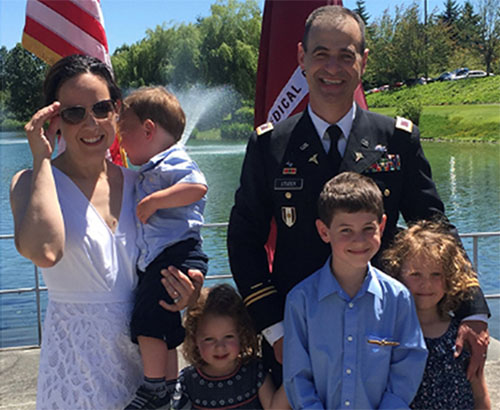‘Kids Serve, Too’: Understanding the Unique Needs of Military-Connected Children

Matt and his family celebrating his promotion to the rank of colonel.
Military service is woven into the fabric of my family. I’m a third-generation career U.S. Army officer following in the footsteps of my father and both of my grandfathers. My wife, uncles, cousins and nephew have also proudly served in the U.S. armed forces.
Like most Army brats — a nickname for kids with parents in the Army — my childhood was spent moving. I was born in Germany and lived in California, Massachusetts, Colorado, Philadelphia, Virginia and finally the Pacific Northwest, all before the age of 14.
Our family’s routine was to move every one to three years as my father’s military assignments changed. As a result, my mother, sisters and I were constantly adapting to new homes, environments, schools and friends. Though it became second nature and part of the culture of our lives, moving and my father being away for extended periods were stressful and a particular burden on my mom.
I share this to demonstrate the uniqueness of the military lifestyle and its impact on families. Constant change, parental deployments, lack of extended family support and changing healthcare teams all impact the medical, social and emotional well-being of military-connected children.
There are currently 1.6 million children in the United States with a parent on active duty or in the military reserves. The Pacific Northwest has a large population of service members, many of whom have kids.
Challenges and Benefits of Being in a Military Family
Over the past two decades, the wars in Afghanistan and Iraq have placed an enormous burden on families. Parents of military-connected children have deployed multiple times and for extended periods into areas of dangerous conflict. Kids worry, don’t fully comprehend where their parent is or what they’re doing and are often asked to “soldier on” while their loved ones are away.
Thankfully, with the closure of these two wars, the number of deployments has diminished. But many concerning issues remain in the world today, and military service members continue to answer the call to serve, pulling them away from their families for long periods of time. That has a big impact on those at home, including the kids.
Being in a military family when a parent is gone for recurrent periods of time is a recognized social determinant of health. Research shows that parents injured in war used 20% less preventative healthcare for their children.
Additional research shows that teens who are military connected have higher rates of behavioral health challenges, psychiatric disorders and the need to use medication. Sadly, the military healthcare system is under-resourced to treat the behavioral and mental health needs of kids, so they lean heavily on providers and resources within the community.
It’s also challenging when a child in a military family has a chronic medical condition. They may have a trusted healthcare team in one location, then move, only to start all over again with a new team. For many, it’s the second or third time they’ve had to start fresh. That’s hard on the family, and it can complicate healthcare outcomes and relationships with new providers.
While there are challenges to being a military-connected child, there are also many benefits. In general, these kids are resilient, have a strong sense of self, make friends easily and adapt well to unfamiliar situations.
There shouldn’t be a stigma associated with kids from military families, but it’s important that healthcare teams understand some of their special circumstances.
Tips for working with military-connected kids and families
The military healthcare system has pediatric residents, pediatricians and pediatric subspecialists, but they can’t always accommodate the sheer number of children in our region. Many of those kids are seen at outside clinics, such as Seattle Children’s.
It’s important to know when we’re working with a military-connected child.
I look and listen for clues like military logos on their clothes, if the family is new to the area and previously lived in a location with a large military contingent or if they make a passing reference to military service. If their health insurance is TRICARE, that’s certainly a sign. Typically, if I have a sense, I’ll inquire if they’re military connected.
My advice is to look for these clues and ask. Families appreciate that you’ve identified they’re military connected and often welcome the opportunity to share their stories. This creates an instantaneous connection, and you might learn something that will be meaningful to the care you provide.
Here are some online resources that you can reference or share with families: